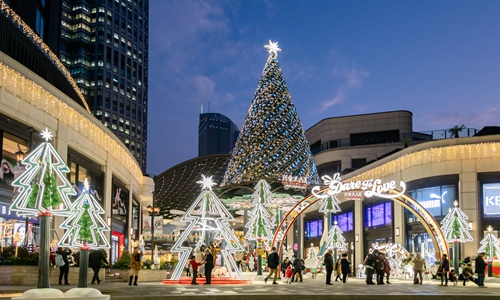HOME >> CHINA
Chinese seemingly less enthused by ‘imported’ festivals such as Christmas
By Zhao Yusha Source:Global Times Published: 2019/12/24 20:33:41
‘Traditional Chinese culture has made a strong comeback’

A Christmas tree in Shanghai in December Photo: CNS Photo
Whether to celebrate Christmas garnered heated discussion on the Chinese social media platforms, with many asserting that the festival, along with other "imported festivals," was gradually losing its sheen for Chinese as they formed a clearer picture of Western culture and values.
Many Chinese also attributed the phenomenon to a surge in Chinese cultural confidence, bolstered by a renewed promotion of a rich and ancient culture.
Shops and buildings nationwide used to begin to decorate with traditional Christmas elements such as Christmas trees weeks, even months ago.
But this year, many Chinese who are not Catholic and Christian, asserted that the festival was failing to capture enthusiasm.
A Tuesday survey launched by a Sina Weibo account with more than 3 million followers asked people how they will spend Christmas, with 2,975 out of 4,434 respondents saying they would spend it on their own, as the festival has nothing to do with them.
May Yu, an employee at a foreign-invested bank in Beijing, said about 70 percent of her friends on WeChat applied to put a Santa Claus red hat on their profile photos a few weeks before Christmas last year, but this year she hadn't seen any doing it.
"Most Chinese people do not have recognition of Christmas, or any other Western 'imported festivals' culturally and religiously. For them, it is just another festival for shopping, hanging out with friends," Wendy Xie, a Beijing-based writer, told the Global Times on Tuesday.
Xie said for this reason, the festival's attraction has withered away very quickly.
The function of Christmas as a shopping spree has been absorbed by the emergence of China's own shopping festivals, such as Double 11 on November 11 and Double 12 on December 12.
She noted that she also formed a deeper understanding of Western cultural and value throughout this year, which was rife with US interference in China's internal affairs, such as Hong Kong and Xinjiang, and also the "Western media's biased reports about China."
Chinese culture
Chinese experts say that along with Western festivals losing their sheen, traditional Chinese festivals are being reabsorbed by more Chinese public.
China's traditional Winter Solstice Festival, or Dong Zhi, two days before Christmas this year, triggered lively discussion, with participants trying to convince others that their hometown food, such as dumpling, is the best.
"My WeChat was filled with discussions of the Winter Solstice on Sunday," said one Beijing resident who only gave his surname as Huang, "While in sharp contrast, very few comments on Christmas these days."
Traditional Chinese culture has made a strong comeback in recent years and won over many young people, a Peking University professor who only gave his surname as Zhang told the Global Times on Tuesday.
"As China's comprehensive power has soared, many people's cultural confidence was boosted and they have wanted to track their roots in traditional culture," he said.
The traditional Chinese hanfu robe, with a history of thousands of years, has become an inexorable fashion trend among Chinese youth.
It is estimated that more than 2 million people have spent money on the hanfu industry, which operates at a scale of 1.09 billion yuan ($0.16 billion), the Xinhua News Agency reported in October.
Many industry insiders allege that apart from the economic benefits, hanfu's popularity signals young Chinese people's boosted cultural confidence.
Li Ziqi, a prolific vlogger from a village in Southwest China's Sichuan Province has been deemed a model "cultural ambassador of China" as her videos of the daily work of a farmer, from harvesting vegetables to other parts of farm life, have attracted more than 7.49 million fans on YouTube.
Many followers praised Li for enhancing their understanding of China and Chinese culture.
According to a recent poll conducted by the Global Times' Global Poll Center, whose respondents were residents aged 18 or older in 17 countries, 20.9 percent of US respondents think Chinese cultural products helped elevate the country's international image.
As Christmas approaches, a small group of Chinese internet users staged an online boycott of the festival saying they refused to celebrate "imported festivals."
Such a boycott was unnecessary, said Zhang, the Peking University professor, urging those people to look at imported cultures and festivals in an open-minded way, which is another manifestation of cultural confidence.
"China's strong culture is like a tree with deep root, not for the imported culture to evade," Zhang said.
Chinese cultural commentators asserted that Chinese people used to be excited about Christmas as they were curious and once believed that Western culture was superior.
But as China opens up, they said, Chinese people are more exposed to the outside world and now view exotic culture in a fairly objective way.
"But this does not mean that we are entitled to be arrogant and conservative. Inclusion is the optimal way," Zhang said.
Newspaper headline: Western festivals losing sheen with Chinese public: experts
Posted in: SOCIETY